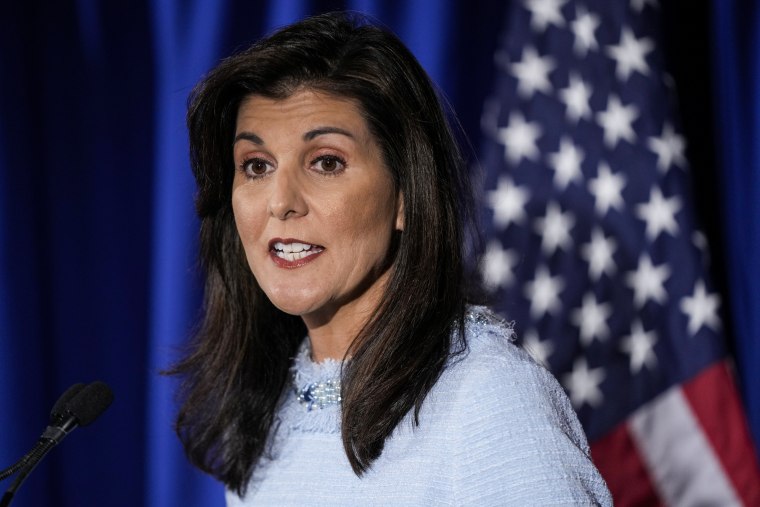ARLINGTON, Va.— Former UN Ambassador Nikki Haley urged “consensus” on the issue of abortion Tuesday, downplaying the importance of the debate over exceptions and weeks of pregnancy and praising the Supreme Court for sending decisions about this topic back to the states.
Haley, who also previously served as governor of South Carolina, made clear she does see a federal role to play. But she didn't detail her positions on many of the central questions that have dominated the debate at both the federal and state level.
“My goal as president will be the same as it was when I was governor and ambassador: I want to save as many lives and help as many moms as possible,” Haley said, speaking to a room of invited supporters and press at the Susan B. Anthony List headquarters— a mainstay group of the anti-abortion rights movement. “At the federal level, the next president must find national consensus.”
Haley, thus far the only woman in the burgeoning GOP field of presidential hopefuls, is seeking to take a more proactive posture on the issue while several of her other rivals find themselves more reactive amid questions about whether abortion will again roil the national political landscape in 2024 as it did in 2022.
The former governor put the issue into personal terms, citing her husband’s adoption journey, as well as their own struggle to conceive their children. “I believe every life is a blessing from God,” Haley said, adding “My heart hurts when someone decides not to go through with a pregnancy.”
Haley praised last summer’s Supreme Court decision for making the states “free to forge consensus once again” on abortion, commending states that have offered more restrictions on abortion while saying of other states that have “doubled down”: “I wish that wasn’t the case, but it is. Different people, in different places, are taking different paths. That’s what the Founders of our country envisioned. It’s the reality of living in a democracy.”
Nevertheless, Haley stressed the need to come away from the extremes on the issue, outlining several specifics— though none about her own stance on how many weeks of pregnancy she’d allow abortion to be legal through.
“We must do better when it comes to adoption,” she said, while also limiting late-term abortions, making contraception more available, and making clear that women who get abortions should not be jailed or face the death penalty, as some in the right-most wing of her party have suggested.
“That’s the least pro- life position I can possibly imagine,” Haley said.
And while she skipped specifics she’d back now that she’s a presidential candidate, she leaned heavily on her record.
While serving as a state lawmaker, she voted “for every pro-life bill that came before me,” making “it easier for women to get ultrasounds” and requiring a “24-hour wait before abortions,” she said.
As governor, Haley continued, the state government passed the “Born Alive Infant Protection Act” to protect babies during “botched abortions” as well as signed another law that established a ban abortions after 20 weeks with exceptions for the life of the mother or if a doctor determines the fetus can’t survive outside the womb.
“I’m not done yet,” the 2024 hopeful said.
Haley also harkened back to one of the most emotional and divisive issues of her gubernatorial tenure to bolster her abilities to navigate the thorniest and most intractable of issues: removing the Confederate flag from statehouse grounds in South Carolina after the mass shooting at Mother Emanuel Church in Charleston.
“We found consensus on a tough issue,” she said, citing how Republicans and Democrats “saw past difference and united to move forward…What was true then with flag can be true now about abortion: this shouldn’t be about one movement winning and another one losing.”


